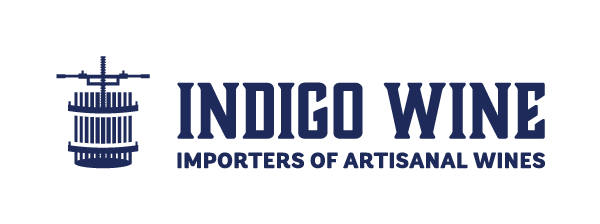
In the heart of Santa Barbara County, Alice Anderson is doing something quietly radical. As the winemaker and farmer behind Âmevive—a name that translates from French as “living soul”—Alice doesn’t just make wine. She cultivates an entire ecosystem.
We sat down with Alice to talk about her path into wine, what it means to nurture a historic vineyard, and how intention, animals, and native plants are part of the soul of her Âmevive project.
From Horses to Harvests
“I didn’t grow up in wine or anything,” Alice admits. “I grew up riding horses and raising animals. Agriculture always interested me, but it wasn’t part of my family background.” That changed when she enrolled at Cal Poly, one of California’s few universities offering a dedicated wine and viticulture degree. There, she met peers like Gina and Mikey of Lady of the Sunshine & Scar of the Sea—fellow Indigo producers, who, like Alice, are shaping the future of California wine. After graduation, Alice set off on a global journey that many young winemakers know well: a kind of “harvest hopping” that exposes them to vineyards around the world.
“It’s one of the beautiful things about wine—every winemaker is shaped by the places and people they’ve worked with. You have this really distinct lineage of people you’ve worked for.”
Her first transformative experience came at Rippon in Wanaka, New Zealand, where she worked a full pruning season. “It was the first time I spent every day in the vines, and it changed my life.” That hands-on farming experience led her to France, where she spent two years working at Domaine Pierre Gaillard. Despite her love of French culture and French wine, something pulled her back to home: “As a mid-twenties single girl living in a stone hut in the middle of nowhere, I wasn’t quite ready for that level of isolation.” So she returned to California—and found her home in Santa Barbara County.
The Soul of Âmevive: Ibarra-Young Vineyard
At the heart of Âmevive is a singular piece of land: the Ibarra-Young Vineyard. Planted in 1971 by Charlotte Young, it remains in her family today—leased and lovingly farmed by Alice and her small team. The vineyard has a storied history. In 1986, Bob Lindquist, one of the pioneering figures of the Santa Barbara wine scene, an original “Rhône Ranger” and founder of Qupé, began leasing and organically farming the land. “He transitioned everything to organic in 1993,” Alice told us. “So this land has been organic since before organic was cool.”
A Regenerative Revolution
Since taking over farming in 2019, Alice has gone far beyond organic. “We’ve become known for a more unconventional farming style,” she explains. “We’re fully no-till, fully regenerative, and fully integrated with animals.” That means rotational grazing with sheep, chickens and ducks. “It’s a full-time job raising animals in the vines,” she laughs, “but their presence plays a vital role.” Chickens and ducks help control pests. Sheep munch the cover crop, reducing the need for tractors. And their manure? Nature’s fertilizer. But the benefits go beyond the practical.
“There’s this energetic benefit [to raising animals]. The more intention you put into a place, the more time you spend walking your vineyard, the more it shows in the final wine. Especially when you’re making wines that are living—unfined, unfiltered.”
Restoring her Native Landscape
Beyond animals, Alice is on a mission to restore native ecology in the vineyards. “We want something blooming 365 days a year,” she explains. That means planting hedgerows and pollinator rows, inviting bees, butterflies, and beneficial insects back into the landscape.
“The hedgerow at Ibarra-Young is about three years old now, and it’s my pride and joy,” she beams. “It’s really well established and just beautiful. And we’ve got annual pollinator rows running the length of the vineyard too. Right now, with all the flowers blooming, it’s just beautiful.”
The Living Soul
Everything Alice does—from grazing sheep to planting wildflowers—is grounded in the belief that great wine is not just made; it’s grown, nurtured, and lived. Âmevive isn’t just a winery. It’s a living, breathing organism rooted in its place, and in the people who care for it.
The wines are a direct reflection of the land she nurtures, and here entire range has a brightness to them—a product of the Californian heat but also Alice’s playful, sunny nature.


